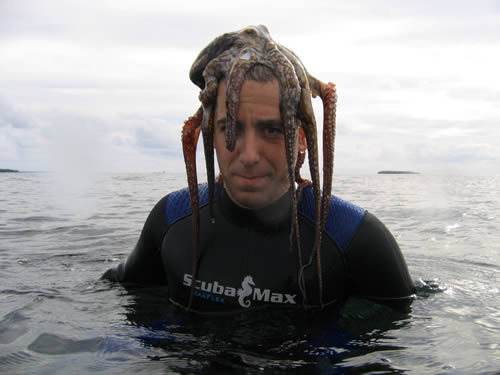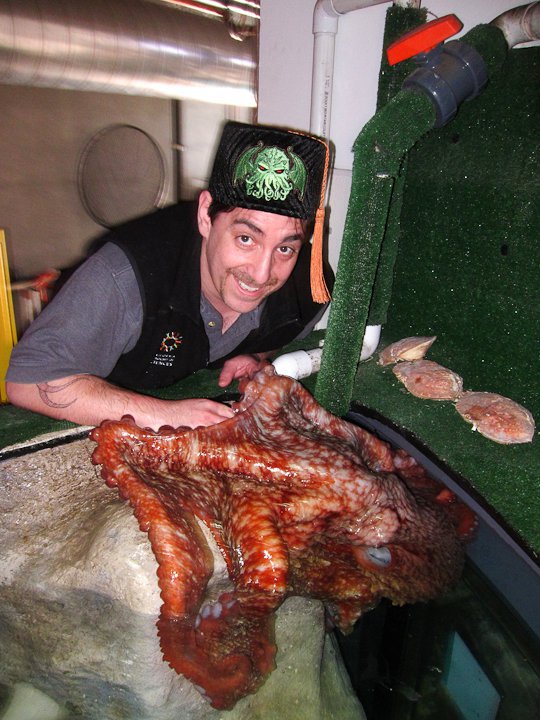| |
Talks and Bio

About Richard Ross
Long Version:
Richard has been keeping saltwater animals for
over 25 years, and has worked in aquarium maintenance,
retail aquarium stores, and marine wholesalers.
In 2004, Rich was selected to help establish
a coral farm in Tonga. He is a writer/photographer
for Reefs Magazine, Advanced Aquarist, Reef
Hobbyist Magazine, Reef Life Magazine, Tropical Fish Hobbyist,
FAMA, C the Journal of Aquatic Science, Travel
and Adventure, Reef Builders, as well as authoring
scientific papers. He is also a frequent speaker
at aquarium confrencences and events. He has
been a crew member at wet web media and is
currently staff at Reefs.org, TONMO.com and
Azoox.org. Rich is an avid diver/underwater
photographer and videographer, and designed
a permanent video exhibit for the Birch Aquarium
at Scripps - "The
Art of Deception".
He is also a founding member and past president
of Bay Area Reefers, the largest reef club
in Northern California.
In 2008, Richard landed
his dream job as an an
Aquatic Biologist at the Steinhart Aquarium in
the California Academy of Sciences, maintaining
many exhibits including the 212,000 gallon Phipipine
Coral Reef. He is an avid underwater videographer
and has been fortunate to scuba dive all over
the world. At home he maintains a 300 gallon
reef system and a 250 gallon cephalopod/fish
breeding system, and was one of the first people
to close the life cycle of Sepia bandensis. When
not doing all that stuff, he enjoys spending
time with his patient wife, his incredible daughter
and their menagerie of animals, both wet and
dry.
Short version:
Richard Ross currently
works as an Aquatic Biologist at the Steinhart
Aquarium in the California Academy of Sciences,
maintaining many exhibits including the 212,000
gallon Philippine Coral Reef. He has kept saltwater
animals for over 25 years, and has worked in
aquarium maintenance, retail, wholesale and has
consulted for a coral farm/fish collecting station
in the South Pacific. Richard enjoys all aspects
of the aquarium hobby and is a regular author
for trade publications, a frequent speaker at
aquarium conferences and was a founder of one
of the largest and most progressive reef clubs
in Northern California, Bay Area Reefers. He
is an avid underwater videographer and has been
fortunate to scuba dive all over the world. At
home he maintains a 300 gallon reef system and
a 250 gallon cephalopod/fish breeding system,
and was one of the first people to close the
life cycle of Sepia bandensis. When not doing
all that stuff, he enjoys spending time with
his patient wife, his incredible daughter and
their menagerie of animals, both wet and dry.
|
Aquarium
talks |
From Hobbyist to Professional Aquarist
- 212,000 gallons of reef
In 2008 Richard landed his dream as an aquatic
biologist at the Steinhart Aquarium in the California
Academy of Sciences, just in time for the migration
from its temporary home to its completely rebuilt,
state of the art facility in Golden Gate park
which houses, among other cutting edge exhibits,
a 212,000 gallon reef aquarium. This talk will
discuss not only the huge reef tank project from
conception to ‘completion’, but also
Richard’s transition from being mostly
a hobbyist (and stay at home dad) to full time
aquarist at a major public aquarium.
|
Is that reef thing you say true,
or did someone just tell it to you?
Reef keeping is as much an art as it is a science.
There is so much that we don’t understand
about what actually goes on inside our boxes of
water that we must rely on cultivating a ‘saltwater
thumb’ for success over time. Building that
saltwater thumb, however, can be a daunting task.
There are a million opinions on every aspect of
reef keeping, and todays reefkeeper can access
those opinions thru websites, magazines, online
forums, or those big heavy things on the shelves
at home (Books? I think that’s what they’re
called). All that information seems great at first
glance, but it turns out that you can find support
for every aspect of the hobby regardless of how
'fringe' it may be. The question is, how do you
sift through all those opinions to make decisions
about what to do with your reef tank? In this presentation,
we'll talk about how to deal with conflicting information,
methodologies, opinions and products that are available
to the modern reefkeeper. |
Keeing and breeding Cephalopods
Octopus, Squid and Cuttles have captivated people
since before anyone really knew anything about
them. Both tiny and huge, there is something
so intriguing about a wriggling mass of arms,
tentacles, suckers, beaks and huge eyes that
many myths and legends have risen up about these
beasties. Do they attack ships and eat fisherman?
Not so much, but they may try to escape from
your tank and some can inject you with venom
if they bite you! With their color changing abilities,
apparent intelligence, boneless appendages and
interactive nature, cephalopods are some of the
most interesting animals to observe in the wild,
or keep in home aquaria. And never has the time
been better to keep these animals - we know more
about which species are appropriate for captivity
and how to care for them than ever before. In
this talk, well cover cephs in general, their
impact on human culture, the different kinds
of cephs available for home tanks, husbandry,
and breeding strategies with plenty of photo
and video eyecandy. |
Coral Farming, Fish Collecting and
the Chain of Custody.
Before a coral or fish makes it to our tanks,
it goes through a complex chain of custody. What
happens of that chain has a large impact on the
overall short and long term health of the animals.
Several years ago I had the opportunity to consult
on a fish collecting station/coral farm in Tonga.
The experience was amazing, and although the
project didn't work out, I am
pleased to share some the realities most hobbyists
never get to see. The talk will cover the nuts
and bolts of fish and coral collecting, coral
mariculture, the chain of custody, and some worries
and hopes for the future. |
Papua New Guinea - from Reef to
Muck
Papua New Guinea is part of the coral triangle
and has some of the greatest underwater diversity
in the word - everything from 'muck' diving to
pristine reefs. This talk will be full of video
and photo eye candy illustrating this amazing
area of the world. |
Specific talks on Wunderpus, Sepia
bandensis, Metasepia and Octopus chierchiae are also
available as well as custom talks on various aspects
of the Aquarium hobby and trade.

|
|
|
|